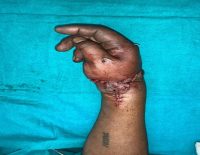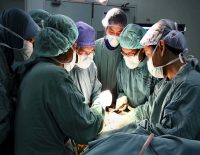How cancer care is working in North-Eastern states that report maximum cancer and minimum Covid-19, speaks Dr. Abhishek & Dr Deepak

Aizawl (Mizoram) and Papumpare (Arunachal Pradesh) have been reporting highest age-adjusted cancer incidence rates in male and female respectively. Current pandemic has adversely affected the cancer care delivery in view of complete lockdown situation.
The North-Eastern states have reported the highest incidence of cancer as per National Council of Disease Informatics and Research, Indian Council of Medical Research report. Aizawl (Mizoram) and Papumpare (Arunachal Pradesh) have been reporting highest age-adjusted cancer incidence rates in male and female respectively. Current pandemic has adversely affected the cancer care delivery in view of a complete lockdown situation. Every day, hundreds of new coronavirus cases are being reported in India, but North-Eastern states have reported cases in single-digit except Assam and Meghalaya till 25th April 2020 as per Ministry of Health & Family Welfare, Government of India website. Nagaland and Sikkim have not reported any COVID-19 patients and 23 patients have been discharged with two COVID related mortality.
Excessive consumption of tobacco products in different forms are the major risk factor and 57% of all cancers in male and 28% of female in the northeastern region. Also, tobacco consumption either smoke or smokeless is also associated as a risk factor for COVID-19 making people of northeastern states, a potentially vulnerable group for the severe or critical form of coronavirus disease.
COVID-19 and cancer patients risk
People who are at higher risk of coronavirus infection are elderly person with co-morbidities like hypertension, diabetes, cardiovascular & respiratory disease and cancer.Study by Cai et al suggested a small percentage of patients had pre-existing conditions including diabetes (6.4%), hypertension (12.8%), cardiovascular disease (3.7%), liver diseases (2.7%), malignancy (1.4%), and others (3.7%).
Cancer patients are more susceptible to COVID-19 because of their systemic immunosuppressive state caused by the malignancy and anticancer treatments, such as chemotherapy, targeted therapy and immunotherapy and possess higher susceptibility of community and hospital-acquired infections. Several studies reported high mortality in cancer patients infected with the novel coronavirus.
Cancer patients amid COVID-19 crisis in North Eastern States
Despite the highest cancer cases in a year in India, multimodality cancer treatment centre are very few in number with only a few oncology experts in northeastern states. Local physicians and hospitals seldom do more than merely referring a cancer patient to other cities and states like Guwahati, Kolkata, Mumbai, Vellore and Delhi. There has been an increase in the number of cancer care facilities but many more are required to fight with the most common public health problem in the northeastern region.
Current pandemic has forced nations to imposed lockdown and restrict to travel outside their districts and states to prevent the further spread of transmission. Thus, cancer patients who travel outside from northeastern states to avail treatment are stuck at home and there is uncertainty about their treatment and the progression of their diseases.
Cancer patients are facing a stark choice regarding continuing treatment or delaying it to mitigate the Covid-19 risk. Some cancer patients are more vulnerable to severe events, if their treatment is delayed while there is also risk of exposure to coronavirus if they travel out for treatment. Many patients who would normally have travelled to access cancer care, no longer have this option. The major risk for cancer patients is the inability to reach the hospital and even for those that make it getting appropriate treatment once there is not guaranteed.
Cancer patients should stay away from all the myths and misinformation widely circulated on social media platforms causing more fear and uncertainty among cancer patients. This is also the right time to switch to healthy lifestyle by quitting smoking, tobacco consumption and alcohol. These habits are not only the higher risk for severe form of coronavirus disease but also for cancer cases.
In present scenario and for the future also, there is a need to facilitate tele/video-consultations which will allow patients and their families to consult expert oncologists. Tele/video-consultations are helpful to minimise fear and uncertainty only as cancer patients have to present physically for different forms of treatment. It is always advisable to continue their treatment at the nearest cancer centre and inform their oncologist about the status of the disease in view of travel restrictions.
Cancer patients should be advised to avoid crowded areas as much as possible and avoid having visitors or visiting people with respiratory infection symptoms. It is now recommended to use facemasks when going out in public and maintain hand hygiene by frequent hand washing or using hand sanitizers.
Taking Action
Although North Eastern has reported a small number of coronavirus cases but everyone must be prepared and take necessary precaution to prevent spread of infection by maintaining hand and respiratory hygiene. The most important practice is to stay inside the house, maintain social distancing when going out for essential services, report to authorities when symptoms of fever, cough, respiratory distress, sore throat or having contact with COVID-19 patients, and get tested and treated as per the guidelines. Global efforts at this time are focused concurrently on containing spread of the virus and mitigating its impact.
Dr Abhishek Shankar is Assistant Professor in Radiation Oncology at Lady Hardinge Medical College & SSK Hospital, Delhi.
Dr Deepak Saini is Project Officer at Cancer Control and Prevention Division of Indian Society of Clinical Oncology, Delhi.

 (2 votes, average: 4.50 out of 5)
(2 votes, average: 4.50 out of 5)






Comments